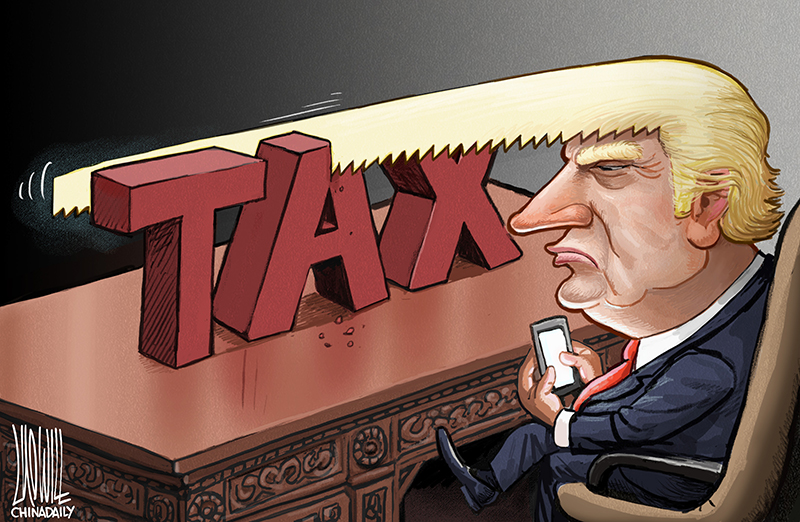Will Trump's tax cuts go the Reagan way?
China Daily | Updated: 2017-12-15 07:03

Luo Jie / China Daily
Editor's Note: The Center for China and Globalization, a Beijing-based think tank, recently organized a seminar on the impact of the US tax reduction bill on other economies. Following are excerpts from the speeches delivered by three participants:
China must guard against ill effects
The passing of the tax bill is a personal triumph for US President Donald Trump. But the reduction of taxes by such a big margin will increase the financial burden of the United States federal government, and the largest beneficiaries will be the 1 percent richest people.
Trump says the tax cuts will encourage manufacturing industries to return to the US and boost household consumption. But as similar measures taken by Trump's predecessor Barack Obama show, they might not yield the desired results.
It will take some time, perhaps one year, to see the effects of the tax cuts on industries and consumption. But few companies are likely to relocate their manufacturing units just to enjoy the tax cuts.
The Ronald Reagan administration's tax reduction policy coincided with the booming of the IT industry and innovations. That is to say, only reducing taxes is not enough to revitalize the US' manufacturing sector. To offset the possible side effects of a single macro-policy, a government usually needs to carry out two to three supporting policies, which the Trump administration may do. But even Reagan had to raise the taxes two years later.
Still, China must be prepared to deal with the impact of the US tax bill. And if the to-do list issued by the 19th National Congress of the Communist Party of China, including measures for fee and tax reduction, and improving the business environment, is well implemented, China can offset the negative impact of the US tax cuts.
Huo Jianguo, a researcher at CCG and former director of Chinese Academy of International Trade and Economic Cooperation Institute of the Ministry of Commerce
Political game or economic policy?
The passing of the tax bill shows there is little hope of a compromise between the partisan interests and long-term national interests in the US. It also shows the Republicans are more intent on building protectionist walls than taking measures to guarantee social fairness and justice to US citizens.
Trump was elected US president because he promised to work for the betterment of the lower-level workers. But the tax bill shows he has sided with the conservative white upper class, as the rich will hugely benefit from the tax cuts while the lower middle class and the poor continue to suffer.
The idea of "small government" has made the lower middle class and the disadvantaged people fear the very idea of a big government. So Trump may continue to enjoy support as long as he appears to keep his administration small. This thinking lies behind the tax cuts-as it suggests the government will interfere less with the economy and society.
The biggest problem with the US economy is inequality-the widening gap between the rich and the poor as well as the suppression of the middle class. As the middle class' income dwindles, so does its size in the US; it doesn't seem to have benefited from globalization, and its sense of insecurity is palpable, and that's why Trump won the presidential race.
The US tax bill is more of a political game than an economic policy, because without supporting policies, the tax cuts will not produce the desired results. It is worth recalling that the Ronald Reagan administration was forced to raise taxes two years after reducing them, as it could not bear the burden of the national debt. Will we see the same happening this time?
Shou Huisheng, a researcher at CCG and National Strategy Institute of Tsinghua University
To lower risks, improve business environment
The tax cut may bring about some small changes in trade, too small to be noticeable. Many American companies say they never left the US, because it is normal for transnational corporations to spread and develop across the globe.
The US tax cuts, however, do not mean the profits of US companies operating in China and other markets will "drop", prompting them to shift their manufacturing base to the US. Still, China should improve its business environment, at least to offset the potential negative impact of the US tax cuts.
During Trump's visit to China last month, the two sides signed business deals worth more than $250 billion, partly because China has lowered the threshold of its financial market and reduced tariffs on more than 180 kinds of products. As China remains committed to further opening up its market and welcoming more foreign investment, an improvement in its business environment, as an important part of its reform and opening-up, will also help offset the impact of the US tax cuts.
He Ning, a researcher at CCG and former director of the department of the North America, South America and Oceania with the Ministry of Commerce
























